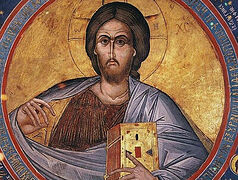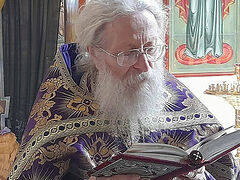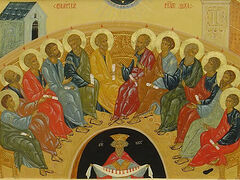 Photo: trsobor.ru The wise Solomon, distinguishing the times for the various affairs of life, and assigning to each one what is suitable, said: There is a time for all, and a time for every thing; a time to be born, and a time to die. But, making a slight change in the sentence of the wise man, in proclaiming to you the saving Gospel, I say to you; there is a time to die, and a time to be born. What reason is there for this inversion? Solomon treating of birth, and dissolution, in conformity with the nature of bodies, spoke of birth before death, (for it is impossible to die without being born): but as I am about to treat of spiritual regeneration,1 I place death before life: since it is by dying to the flesh, that we come to be born in the Spirit; as even the Lord says: “I will kill, and I will make to live.” Let us then die, that we may live. Let us mortify the carnal feeling, which cannot be subject to the law of God, that a strong spiritual affection may arise in us, through which we may enjoy life and peace. Let us be buried together with Christ, who died for us, that we may arise again with Him, who proffers new life to us. For other matters there is a time peculiarly appropriate: a time for sleeping and for waking, a time for war and for peace: But the whole period of man’s life is the time for baptism.2 For as the body cannot live unless it breathe, neither can the soul live unless she know the Creator; for ignorance of God is death to the soul, and he that is not baptized, is not enlightened; and without light neither can the eye perceive sensible objects, nor the soul contemplate God.3 All time, then, is opportune to receive salvation through baptism—night or day, hour or minute, even the least conceivable space of time. But it is just to regard as more suitable, the time which is more nearly connected with it; and what time is more closely connected with baptism than Easter day, since the day itself is a memorial of the Resurrection, and baptism is the powerful means for our resurrection?4 On Resurrection day, then, let us receive the grace by which we rise again. On this account the Church with a loud voice calls from afar her catechumens, that as she already has conceived them, she may at length usher them into life, and weaning them from the milk of catechetical instruction, give them to taste of the solid food of her dogmas. John preached a baptism of penance, and all Judea went forth to him—the Lord proclaims a baptism whereby we are adopted as children; and which of those who hope in Him, will refuse to obey his call? That baptism was introductory; this is perfective: that separated from sin: this unites with God.5 The preaching of John was of one man, and he drew all to penance: and you, instructed by the prophets: “Wash yourselves: be clean”—admonished by the Psalmist: “Come ye to Him, and be enlightened”— having the joyful proclamation of the Apostles: “Do penance and be baptized, every one of you, in the name of the Lord Jesus Christ, for the remission of sins, and you shall receive the gift of the Holy Ghost”—invited by the Lord Himself, who says: “Come to me all you that labour and are burdened, and I will refresh you” (for all these passages have occurred in to-day’s lesson)—you, I say, tarry, and hesitate, and put off. Although instructed in the divine word from your infancy, have you still not yet yielded to truth?6 always learning, have you not yet attained to knowledge? Through life an inquirer, a seeker even to old age, when will you become a Christian? When shall we recognize you as our own? Last year you awaited the present time, and now again you put off to a future season. Take care that your promises extend not beyond the term of your life. You know not what the morrow will bring forth. Do not make promises concerning things not subject to your control. We call you, O man, to life; why do you shun the call? We invite you to partake of blessings: why do you disregard the gift? The kingdom of heaven lies open to you, he that invites you cannot deceive; the path is easy: there is no need of length of time, of expense, of toil, so why do you delay? Why do you refuse? Why do you fear the yoke, as a heifer that never has borne it? It is sweet: it is light: it does not hurt the neck; but it ornaments it; it is not a yoke put on forcibly—it must be cheerfully assumed. Do you perceive that Ephraim is styled a wanton heifer, because, spurning the yoke of the Law, she wanders far away? Bend then your stubborn neck: submit to the yoke of Christ, lest rejecting the yoke, and leading a loose life, you become an easy prey to wild beasts. “O taste and see that the Lord is sweet.” How shall I make those who know it not, sensible of the sweetness of honey? “Taste and see.” Experience is more convincing than any reasoning. The Jew does not delay circumcision, being mindful of the threat that “every soul that is not circumcised on the eighth day, shall be destroyed out of her people.” And you delay the circumcision—not that which is made by hands, in the stripping of the flesh, but that which is accomplished in baptism, while you hear the Lord Himself: Amen, amen, I say to you, unless a man be born of water and the Spirit, he cannot enter into the kingdom of God. And in that ceremony pain was endured, and wound was caused; but in this the soul is refreshed with heavenly dew, and the wounds of the heart are healed. Do you adore Him who died for you? Suffer then yourself to be buried with him by baptism. Unless you be planted together with Him in the likeness of His death, how will you become partner in His resurrection? Israel was baptized in Moses in the cloud, and in the sea, presenting therein types for your instruction, and sensibly exhibiting the truth which was to be shown in the latter days: and you shun baptism, not as typified in the sea, but really perfected: not in the cloud, but in the Spirit: not in Moses, a fellow-servant, but in Christ, our Creator. Had not Israel passed the sea, he would not have escaped Pharaoh; and if you pass not through the water, you will not be delivered from the sad tyranny of the devil. Israel would not have drunk of the spiritual rock, had he not been typically baptized—nor will any give you true drink, unless you are truly baptized. He ate the bread of angels after baptism; and how will you eat the living bread, unless you receive baptism previously? He entered into the land of promise, on account of his baptism: how can you enter into paradise, if you are not sealed by baptism? Do you not know, that an angel with a flaming sword is placed to guard the way to the tree of life—an awful and burning sword for unbelievers; but easily approached, and shining with mild radiance to believers? For according to the will of the Lord it turns—and its glittering side is presented to the faithful, its burning edge to the unsealed.
Photo: trsobor.ru The wise Solomon, distinguishing the times for the various affairs of life, and assigning to each one what is suitable, said: There is a time for all, and a time for every thing; a time to be born, and a time to die. But, making a slight change in the sentence of the wise man, in proclaiming to you the saving Gospel, I say to you; there is a time to die, and a time to be born. What reason is there for this inversion? Solomon treating of birth, and dissolution, in conformity with the nature of bodies, spoke of birth before death, (for it is impossible to die without being born): but as I am about to treat of spiritual regeneration,1 I place death before life: since it is by dying to the flesh, that we come to be born in the Spirit; as even the Lord says: “I will kill, and I will make to live.” Let us then die, that we may live. Let us mortify the carnal feeling, which cannot be subject to the law of God, that a strong spiritual affection may arise in us, through which we may enjoy life and peace. Let us be buried together with Christ, who died for us, that we may arise again with Him, who proffers new life to us. For other matters there is a time peculiarly appropriate: a time for sleeping and for waking, a time for war and for peace: But the whole period of man’s life is the time for baptism.2 For as the body cannot live unless it breathe, neither can the soul live unless she know the Creator; for ignorance of God is death to the soul, and he that is not baptized, is not enlightened; and without light neither can the eye perceive sensible objects, nor the soul contemplate God.3 All time, then, is opportune to receive salvation through baptism—night or day, hour or minute, even the least conceivable space of time. But it is just to regard as more suitable, the time which is more nearly connected with it; and what time is more closely connected with baptism than Easter day, since the day itself is a memorial of the Resurrection, and baptism is the powerful means for our resurrection?4 On Resurrection day, then, let us receive the grace by which we rise again. On this account the Church with a loud voice calls from afar her catechumens, that as she already has conceived them, she may at length usher them into life, and weaning them from the milk of catechetical instruction, give them to taste of the solid food of her dogmas. John preached a baptism of penance, and all Judea went forth to him—the Lord proclaims a baptism whereby we are adopted as children; and which of those who hope in Him, will refuse to obey his call? That baptism was introductory; this is perfective: that separated from sin: this unites with God.5 The preaching of John was of one man, and he drew all to penance: and you, instructed by the prophets: “Wash yourselves: be clean”—admonished by the Psalmist: “Come ye to Him, and be enlightened”— having the joyful proclamation of the Apostles: “Do penance and be baptized, every one of you, in the name of the Lord Jesus Christ, for the remission of sins, and you shall receive the gift of the Holy Ghost”—invited by the Lord Himself, who says: “Come to me all you that labour and are burdened, and I will refresh you” (for all these passages have occurred in to-day’s lesson)—you, I say, tarry, and hesitate, and put off. Although instructed in the divine word from your infancy, have you still not yet yielded to truth?6 always learning, have you not yet attained to knowledge? Through life an inquirer, a seeker even to old age, when will you become a Christian? When shall we recognize you as our own? Last year you awaited the present time, and now again you put off to a future season. Take care that your promises extend not beyond the term of your life. You know not what the morrow will bring forth. Do not make promises concerning things not subject to your control. We call you, O man, to life; why do you shun the call? We invite you to partake of blessings: why do you disregard the gift? The kingdom of heaven lies open to you, he that invites you cannot deceive; the path is easy: there is no need of length of time, of expense, of toil, so why do you delay? Why do you refuse? Why do you fear the yoke, as a heifer that never has borne it? It is sweet: it is light: it does not hurt the neck; but it ornaments it; it is not a yoke put on forcibly—it must be cheerfully assumed. Do you perceive that Ephraim is styled a wanton heifer, because, spurning the yoke of the Law, she wanders far away? Bend then your stubborn neck: submit to the yoke of Christ, lest rejecting the yoke, and leading a loose life, you become an easy prey to wild beasts. “O taste and see that the Lord is sweet.” How shall I make those who know it not, sensible of the sweetness of honey? “Taste and see.” Experience is more convincing than any reasoning. The Jew does not delay circumcision, being mindful of the threat that “every soul that is not circumcised on the eighth day, shall be destroyed out of her people.” And you delay the circumcision—not that which is made by hands, in the stripping of the flesh, but that which is accomplished in baptism, while you hear the Lord Himself: Amen, amen, I say to you, unless a man be born of water and the Spirit, he cannot enter into the kingdom of God. And in that ceremony pain was endured, and wound was caused; but in this the soul is refreshed with heavenly dew, and the wounds of the heart are healed. Do you adore Him who died for you? Suffer then yourself to be buried with him by baptism. Unless you be planted together with Him in the likeness of His death, how will you become partner in His resurrection? Israel was baptized in Moses in the cloud, and in the sea, presenting therein types for your instruction, and sensibly exhibiting the truth which was to be shown in the latter days: and you shun baptism, not as typified in the sea, but really perfected: not in the cloud, but in the Spirit: not in Moses, a fellow-servant, but in Christ, our Creator. Had not Israel passed the sea, he would not have escaped Pharaoh; and if you pass not through the water, you will not be delivered from the sad tyranny of the devil. Israel would not have drunk of the spiritual rock, had he not been typically baptized—nor will any give you true drink, unless you are truly baptized. He ate the bread of angels after baptism; and how will you eat the living bread, unless you receive baptism previously? He entered into the land of promise, on account of his baptism: how can you enter into paradise, if you are not sealed by baptism? Do you not know, that an angel with a flaming sword is placed to guard the way to the tree of life—an awful and burning sword for unbelievers; but easily approached, and shining with mild radiance to believers? For according to the will of the Lord it turns—and its glittering side is presented to the faithful, its burning edge to the unsealed.
Elijah was not terrified at the sight of the chariot of fire, and the fiery steeds approaching him: but eager to ascend on high, he dared to mount the awful seat; and while yet in mortal flesh, he joyfully took the reins, to guide the flaming chariot, while you hesitate, not to mount a fiery vehicle, but to ascend into heaven through water and Spirit. Why not rather run to obey the call? Elijah showed the power of baptism on the altar of holocausts, having consumed the sacrifice, not by fire, but by water—although the nature of fire is most opposed to water. When the water, with mysterious significance, was for the third time poured out on the altar, the fire began, and it blazed up as if fed by oil. “And he said: Fill four buckets with water, and pour it upon the burnt offering, and upon the wood. And again, he said: Do the same the second time. And when they had done it the second time, he said: Do the same also the third time, and they did so the third time.” The Scripture hereby shows, that through baptism, he that approaches to God, is admitted into his household; and that a pure and heavenly light, through faith in the Trinity, shines forth in the souls of those who approach Him. If I were distributing the gold of the Church, you would not say to me: “I shall come to-morrow, and to-morrow you will give me some,” but at the present time, you would press for your portion, and unwillingly bear to be put off. Now that the munificent Lord offers you, not colored earth, but purity of soul, you frame excuses, you number over many causes of delay, instead of running to receive the gift. O! Strange thing! You may be renovated without being put in the crucible: you may be formed anew, without being broken in pieces: you may be healed without suffering pain; and still, you do not value the favor. If you were the servant of men, and freedom were offered to slaves, would you not hasten at the appointed time, and engage advocates, and implore the judges, that by every possible means your freedom should be obtained? Yes, you would submit willingly to the blow given for the last time,7 so that you might thenceforward be free from lashes. Now the divine herald calls you to freedom, slave as you are, not of men, but of sin; that he may free you from bondage, and make you a fellow citizen of the Angels, and even, by grace, an adopted child of God, heir of the blessings of Christ: yet you allege that you have not time to receive these gifts. O! wretched impediments! base and endless occupations! How long, then, must pleasures be sought after? How long must passion be indulged? We surely have lived long enough for the world: let us live henceforth for ourselves. What is equal in value to our soul? What can be compared with the kingdom of heaven? What adviser should be listened to in preference to God? Who is more prudent than the All-wise? Who is more useful than He, who alone is good? Who is nearer to us than our Creator? Eve gained nothing by listening to the suggestions of the serpent rather than to the command of God. O! Senseless words! I have not time to get cured; let me not yet see the light—do not yet present me to the King. Do you not speak plainly to this effect, nay, still more absurdly? If you were loaded with debts to the treasury, and a reduction of the claim were offered to the public creditors, and someone should maliciously attempt to deprive you of the benefit proffered to all, you would be angry with him, and exclaim against him as interfering with your right to a share of the general indulgence. And now that not only the pardon of past debts, but gifts for the time to come are proclaimed, you do yourself an injury which no enemy of yours could inflict, and imagine that you have suitably provided for yourself, and adopted wise measures, by neglecting to accept forgiveness, and continuing to death laden with sins. Yet you know that even he who owed ten thousand talents, would have been entirely forgiven, had he not provoked the severity of his creditor by his inhumanity towards his fellow-servant. We must also take care, that the same happen not to us, if, after obtaining grace, we pardon not our debtors; which is required of us, that the gift bestowed may be perpetually preserved.
Enter into the recesses of your conscience: refresh your memory. If your sins are numerous, do not despair on account of their multitude—for where sin has abounded, grace will abound more, if you will just accept grace. To him who owes much, much also will be forgiven, that he may love the more. But if your faults are trivial and venial, and not to the death of your soul, why are you anxious about what may happen to you hereafter, while you have hitherto lived without reproach, although you were not as yet instructed in the law of Christ?8 Consider your soul as now placed in a scale, drawn to one side by the angels, to the other by demons. To which of them will you give the affections of your heart? What shall prevail with you? The pleasures of the flesh, or the sanctification of the Spirit? Present enjoyment, or the desire of future happiness? Shall the angels receive you; or shall those who hold you now, continue to hold you fast? When preparing for battle the generals give a watchword to the soldiers, that they may the more easily call on one another for assistance, and recognize one another, should they be mixed up with others in the conflict. No one can know whether you belong to us, or to our adversaries, if you don’t manifest your brotherhood by mystic signs, if the light of the countenance of the Lord is not signed upon you, how can the angel claim you? how can he rescue you from the enemy, unless he recognize the seal? How shall you say, “I am of God,” if you do not bear the mark? Do you not know that the destroying angel passed by the houses that were marked with blood, while he slew the first born in those that were not marked? A treasure unsealed is easily laid hold of by robbers; a sheep without a mark is carried away with impunity.



